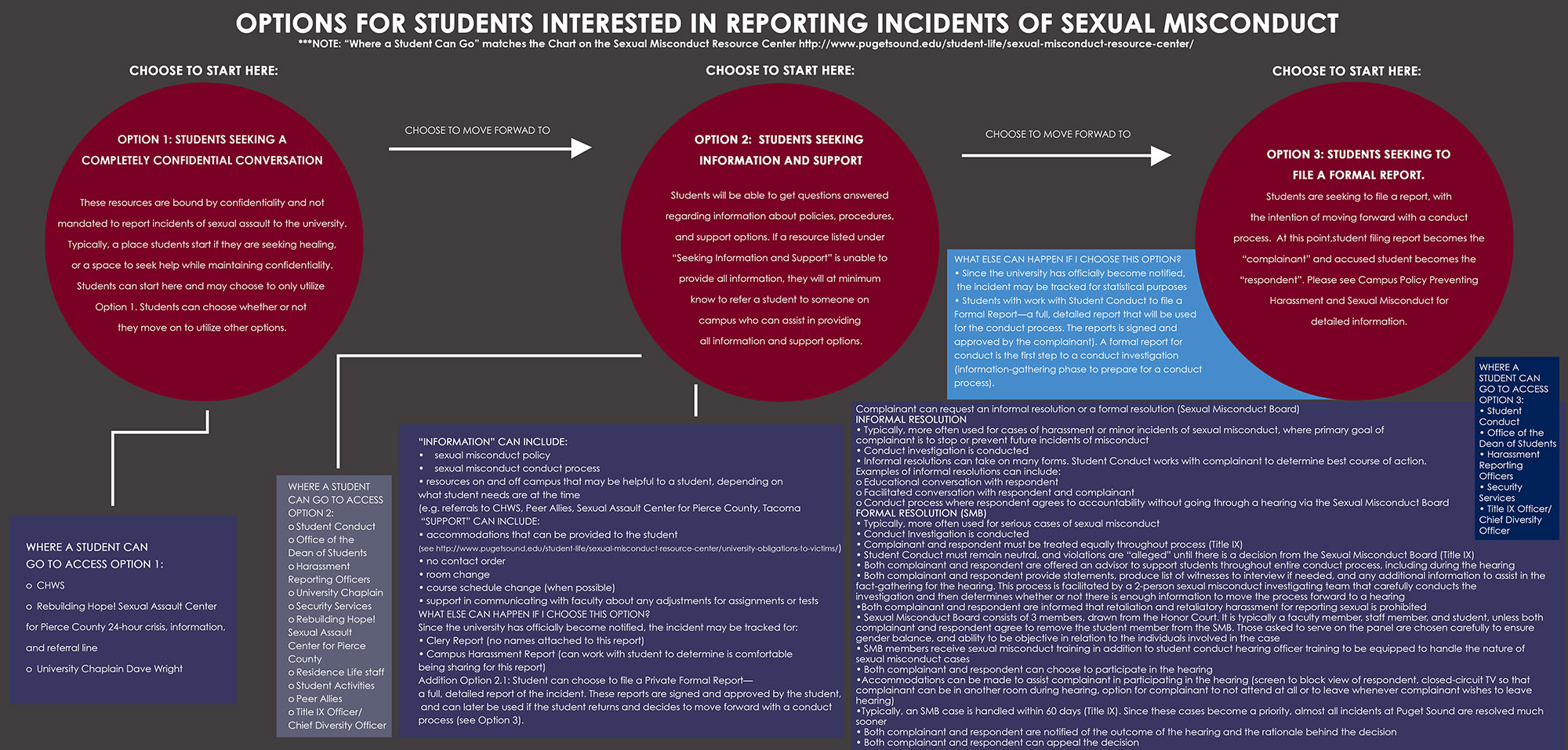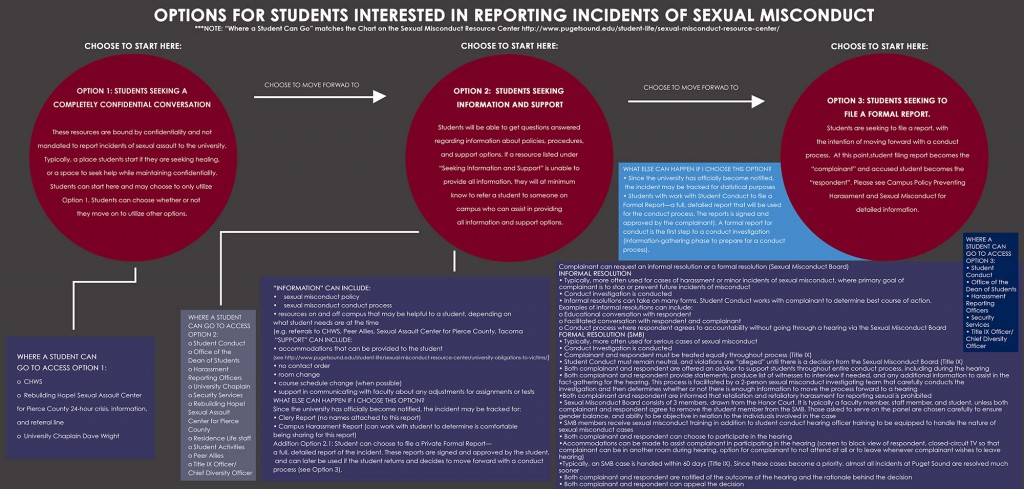Trigger Warning: Campus joins national conversation on sexual assault and reporting policies

Click on infographic for full-size version
Infographic by Leanne Gan
Last May, a number of universities came under the national spotlight when 55 educational institutions were revealed to be undergoing lawsuits for violating Title IX civil rights law. Title IX states that it is the responsibility of institutions of higher education to take immediate action to end sexual harassment and sexual violence.
The University of Puget Sound was not included on the list of 55 schools; however, individuals and student groups are calling for a review of Puget Sound’s policies.
Shana Williams, the friend of a complainant who attended Puget Sound, wrote an article for the Wetlands blog on Oct. 12, addressing several the faults she had witnessed in the University’s Conduct Trial Process.
“There is a serious lack of structure and clarity in the sexual assault and harassment cases handled at University of Puget Sound,” Williams declared in the article. “The conduct and hearing system had failed the complainant.”
Student activist Kaitlyn Vallance outlined areas of the University’s current policy that need revision. She advocates including more strict consequences for perpetrators; confidentiality is currently guaranteed to perpetrators, and the crime is not marked on their transcript.
Under Title IX, any university that receives federal funding must offer the victim the opportunity to relocate dorms and change schedule to avoid the perpetrator. Vallance argued that current policies should do more to make the survivor feel safe.
“Studies show that relocating the victim causes victim feeling of isolation, lack of safe space, poor grades, poor health… This can be extremely retraumatizing,” Vallance said.
Williams, too, emphasized the University’s failure to provide her friend with a safe atmosphere to learn. In addition to the loopholes in the litigation process, she claimed there was vagueness in the way the code of conduct is presented.
For instance, Williams noted in her article, a victim has the ability to request a no-contact order, similar to a restraining order. Williams expressed her dismay at the fact that so many survivors are unaware of this option.
The University has voiced its support of survivors.
The issue is a first priority for the University and we are focusing a good deal of attention on the topic this year—devoting personnel and resources to bringing attention to the issue, reviewing all our policies, emphasizing prevention, making reporting more straightforward, providing training and creating opportunities for students, faculty and staff to voice their perspectives,” University President Ronald Thomas said.
The Office of the Dean of Students alongside ASUPS has facilitated a discussion to hear students’ concerns and talk about the ways in which the University’s policy can improve in the future.
“Speak Up! Student Voices on Sexual Misconduct Policies & Procedures” was held Nov. 6 from noon to 1:30 p.m. in the Commencement Hall Tahoma Room; another session will take place on Nov. 13 from 5:30 to 7 p.m. in the Wheelock Student Center Rotunda.
Krystle Cobian, the Conduct Coordinator of the Office of the Dean of Students, is eager to hear about contentions within the conduct trial process and encourages the student activism that is emerging on campus.
“It’s a huge issue, it always has been. What’s being discussed shows that this isn’t just a conflict between two people, it’s between the community as well,” Cobian said.
One of Cobian’s primary goals for improvements to procedures is increased clarity. This is a goal that is shared by the Office of the Dean of Students, which emphasizes a broader understanding of the procedures as well as a campus climate that would prevent incidences of sexual assault from happening in the first place.
“We focus on prevention; our goal is for this to not happen on campus at all. When it does we want to respond appropriately, making sure that the incident is approached with thoughtfulness, seriousness and care,” Cobian said.
Security Services is also updating their response procedures in reports of sexual assault. Todd Badham, Director of Security Services, wants Security to strengthen their support of survivors in terms of giving the survivor the opportunity to collect evidence of the crime should they decide to press charges.
Currently, according to Badham, if a rape is reported to Security it can be anywhere between two days and two weeks after the incidence occurred. The window for collecting usable evidence through a forensic exam is between 72 and 96 hours.
A survivor can decide not to pursue legal action even if they have had the forensic exam performed. Badham wants this to be an option for more survivors.
“We’re very much interested in getting it right,” Badham said.
According to Badham, one incidence of rape—defined under Title IX as penetration without consent or sex with a minor—was reported for the calendar year of 2013. No additional cases of sexual assault were reported to Security Services in 2013 or to date in 2014, Badham said.
Related articles:
Flaws in the conduct system: mishandling sexual assault (from Wetlands blog)
Title IX and you: law gives students more options
Peer allies provide support for victims of sexual assault
Students rally to ‘Take Back the Night’
Take Back the Night plans fall events on campus

